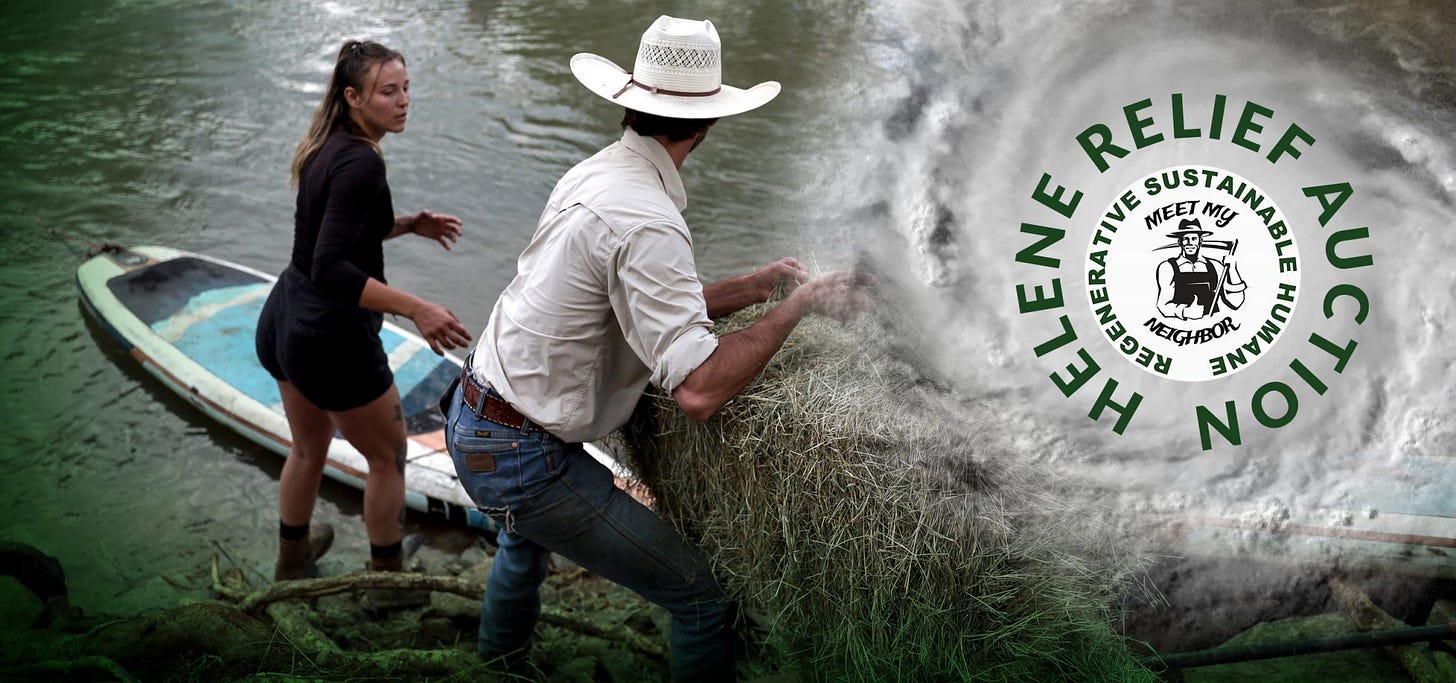Neighbors in Action: How Meet My Neighbor Productions Is Rebuilding Western North Carolina After Hurricane Helene
How One Small Nonprofit Mobilized Relief, Rebuilt Soil, and Reignited Hope for North Carolina’s Mountain Farmers After Hurricane Helene
When Hurricane Helen tore through Western North Carolina, it left a trail of destruction that many are still struggling to overcome. From Asheville to Burnsville, to the small community of Bakersville, rivers surged, topsoil was stripped, and essential infrastructure was wiped away. But amidst the devastation, a nonprofit quietly emerged as a beacon of hope—Meet My Neighbor Productions (MMNP), an organization with a mission to uplift rural communities and educate the public on the vital role of local agriculture.
Now, thanks to MMNP and a network of donors, farmers, and small businesses, the region is not just rebuilding—it's regrowing.
The Storm That Changed Everything
The damage wrought by Hurricane Helen was unlike anything North Carolina’s mountain farmers had experienced. Rivers surged beyond their banks, stripping farms of fertile soil and replacing it with gravel and clay. In some areas, fields were reduced to bare bedrock. For many, it wasn’t just a bad season—it was the end of a livelihood.
"We're down to nothing," said one farmer. "You can’t grow without soil."
According to WRAL News, farms like R Farm in Asheville lost their entire topsoil layer, while others like Gem and Meredith Clum’s herb farm in Burnsville faced near total devastation, salvaging only a portion of their underground greenhouse (WRAL).
A Grassroots Response with Real Impact
MMNP, led by Charlie Rankin, saw the need and sprang into action. Partnering with Brooks Contractors in Goldston, NC, they began hauling truckloads of nutrient-rich compost—over 1,000 cubic yards—to mountain farms, some more than 200 miles away. The initiative has provided a literal foundation for farmers to regrow food and hope.
“We’re doing what we can to help our community get back up and running again,” said Rankin. “And that community stretches across the country when it comes to farmers and ranchers.”
Working with TRACTOR Food and Farms, a regional food hub in Burnsville, MMNP targeted hard-to-reach small farms—places where massive trucks couldn't go. MMNP even used rented trucks to deliver compost to the most remote spots, rebuilding the very soil necessary to sustain life.
Supporting Local Food and the Rural Economy
Beyond compost, MMNP also delivered tons of hay and grain to bison and livestock farms like Buffalo Creek Vacations and Trinity Bison Ranch in Clyde, North Carolina—places hit hard by field losses. These agri-tourism operations, which serve to educate and connect the public with agriculture, were at risk of shuttering. Thanks to donations, they received essential supplies to sustain their animals and stay open to visitors.
In Bakersville, MMNP helped the local grocer “Just Local”—a lifeline for the area’s food supply—by delivering vertical grow towers from Canadian firm Just Vertical, enabling year-round lettuce and herb production in-store after their greenhouse was destroyed. With the town’s only other grocery store closed, the project not only supports local farmers but ensures food security in a region surrounded by little more than Dollar Generals and long drives to Walmart.
“We didn’t just lose infrastructure, we lost an entire local food system,” said store operator Megan Bell. “This helps us survive and, more importantly, helps our farmers recover.”
Resilience Rooted in Community
What sets MMNP’s work apart is its deep integration into the lives and needs of the people it serves. From delivering chicken tractors to cancer-stricken farmers to restoring lost pasture for meat bird producers like Wendy Rein a farmer in Tryon North Carolina, the organization is targeting relief where it's most critically needed.
And it’s not just about rebuilding structures—it’s about reinforcing a culture of mutual support. As Rein described, “People just showed up with chainsaws. We served hot meals. We created community sufficiency.”
Why It Matters
MMNP’s ongoing work reminds us why localized food systems matter. When disaster hits, communities reliant on distant supply chains are left vulnerable. But when neighbors support neighbors, food continues to grow—even from the ashes of destruction.
Across the globe, farmers are being pushed to the margins. What’s happening in North Carolina mirrors similar issues around the world. MMNP’s efforts serve as a rallying cry for supporting local agriculture, not just in crisis—but always.
Get Involved
This movement is powered by people. You can support MMNP’s relief and education efforts by donating.
Support Meet My Neighbor Productions
Final Thoughts
What began as an agricultural education nonprofit has become a lifeline for mountain communities. As Charlie Rankin said, “The work we’re doing is extremely important. We have to educate the public and fight for our farmers.”
Thanks to community action, the mountains are beginning to grow again—not just crops, but resilience.
Written by Yanasa TV, with quotations from WRAL, Spectrum News 1, Meet My Neighbor Productions, and others. For press inquiries or to support ongoing coverage, contact info@meetmyneighbor.org.



